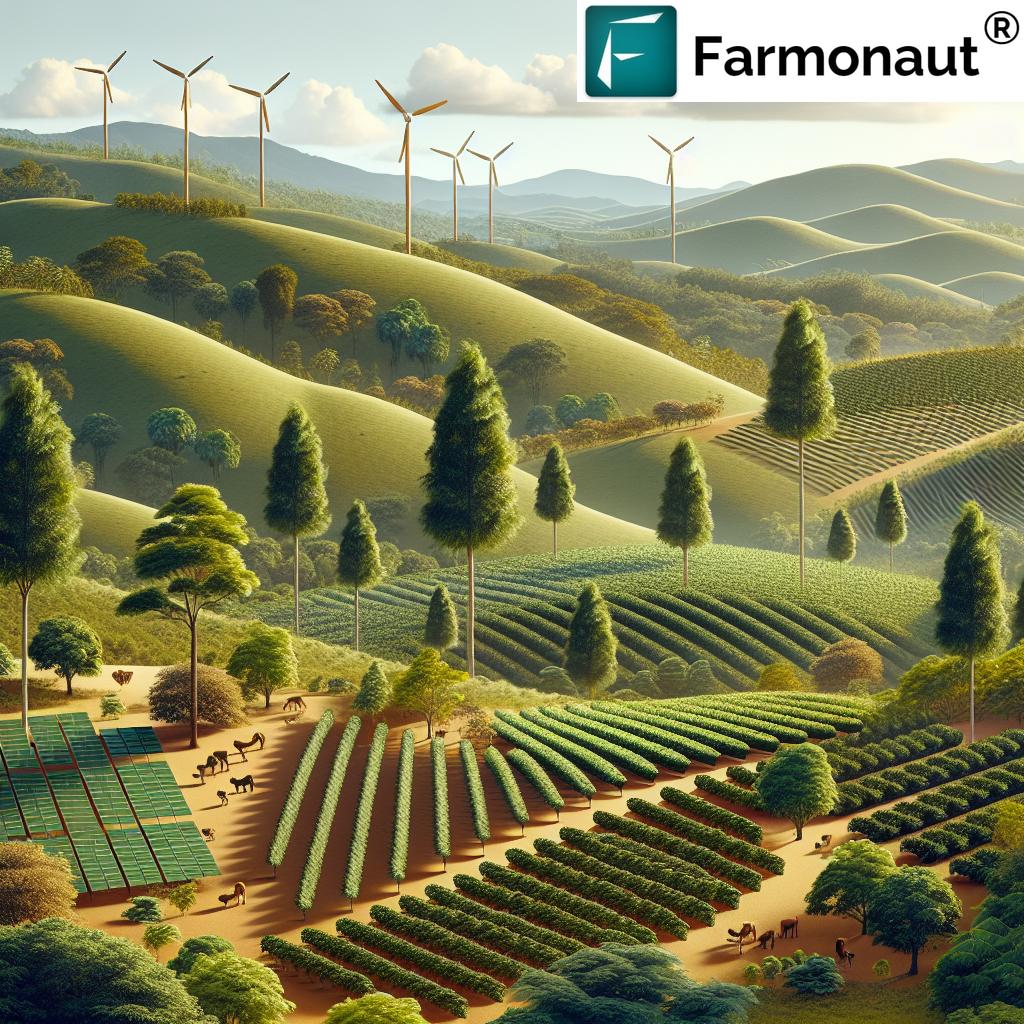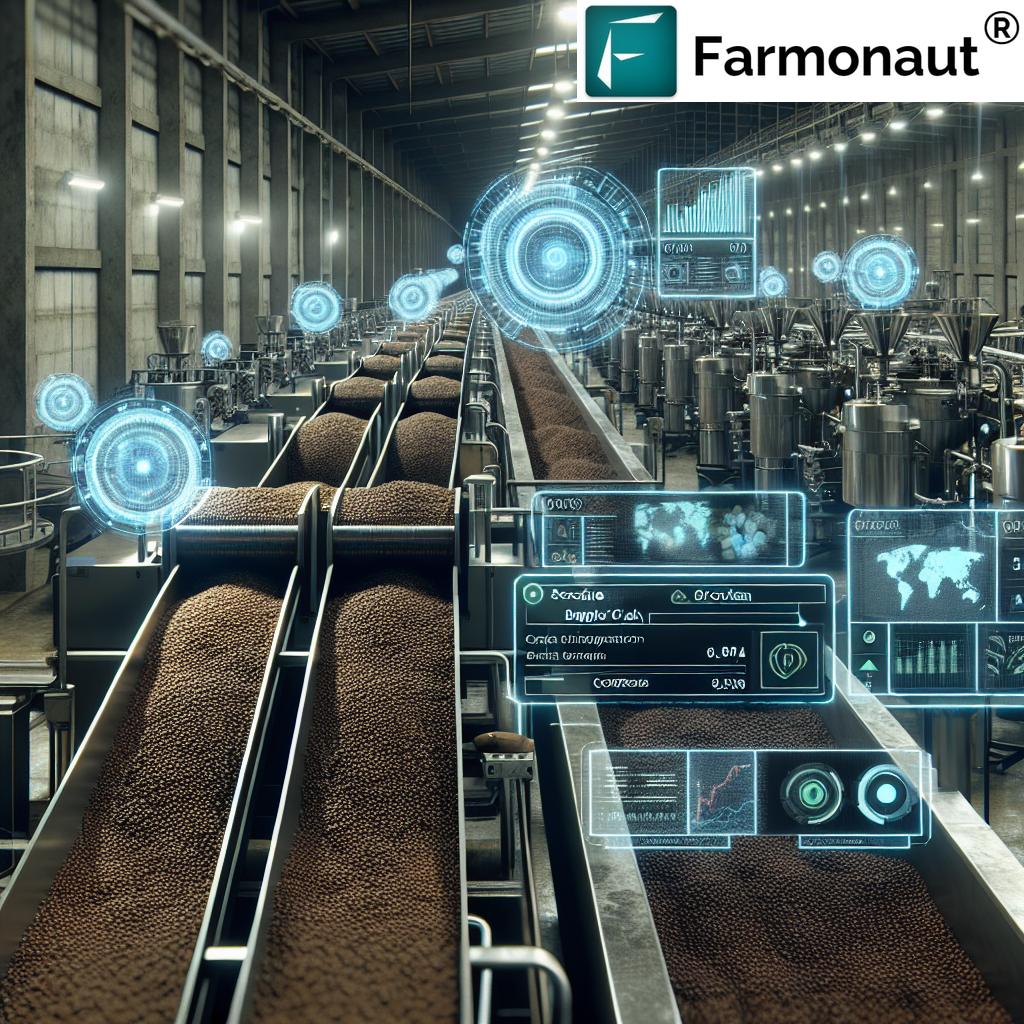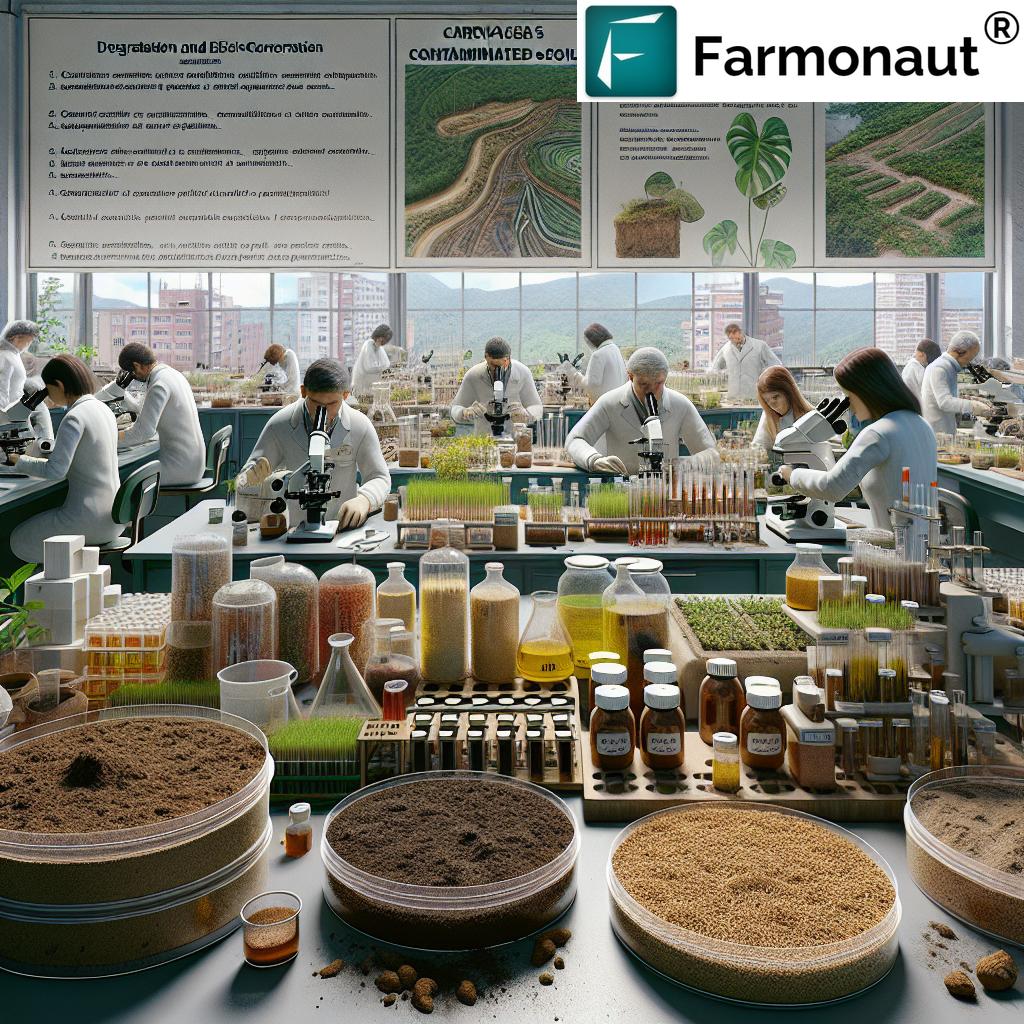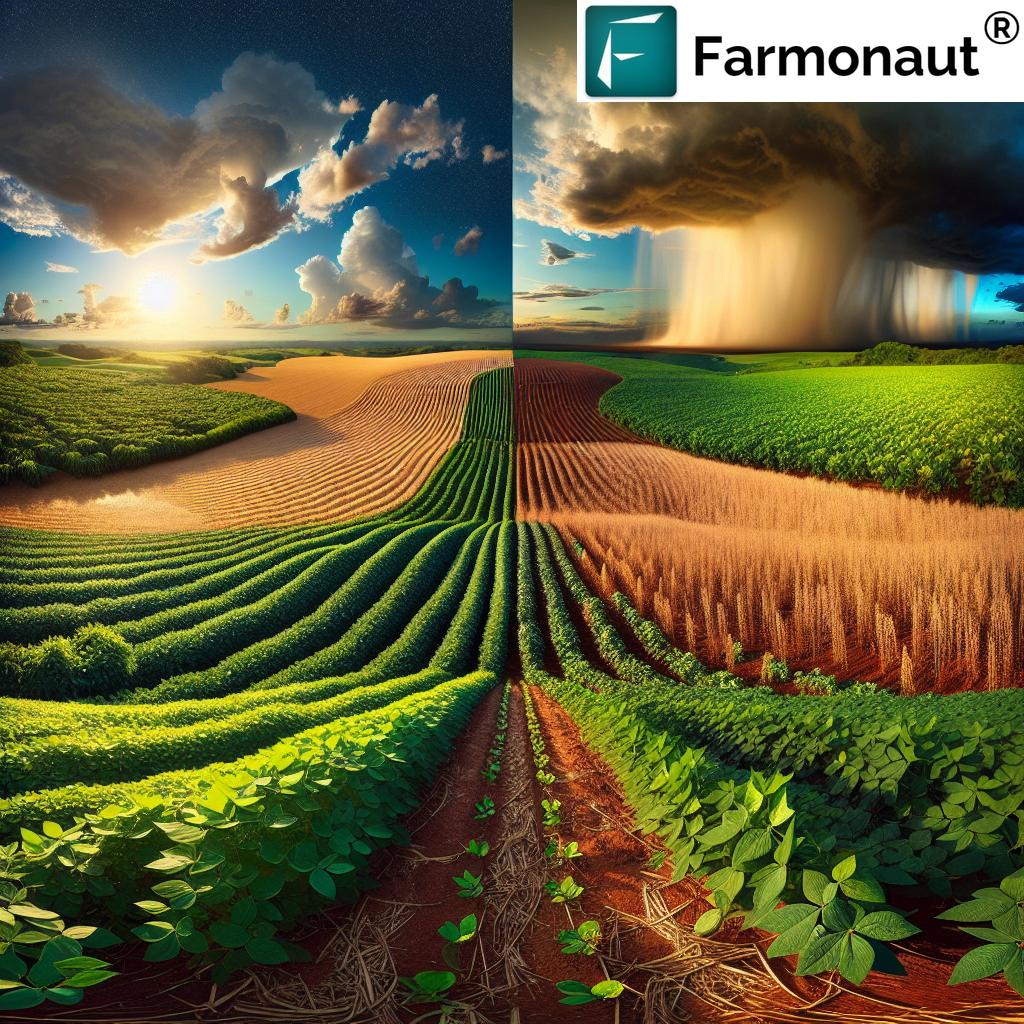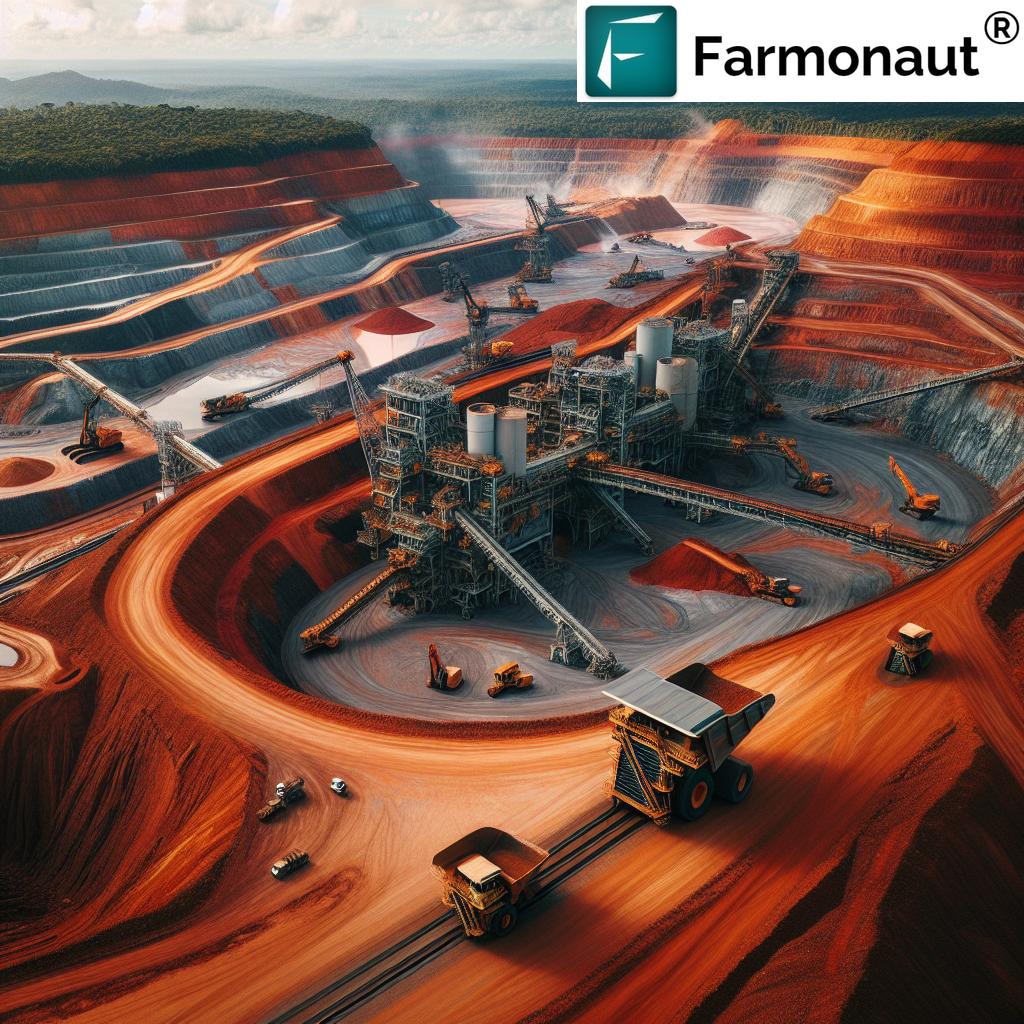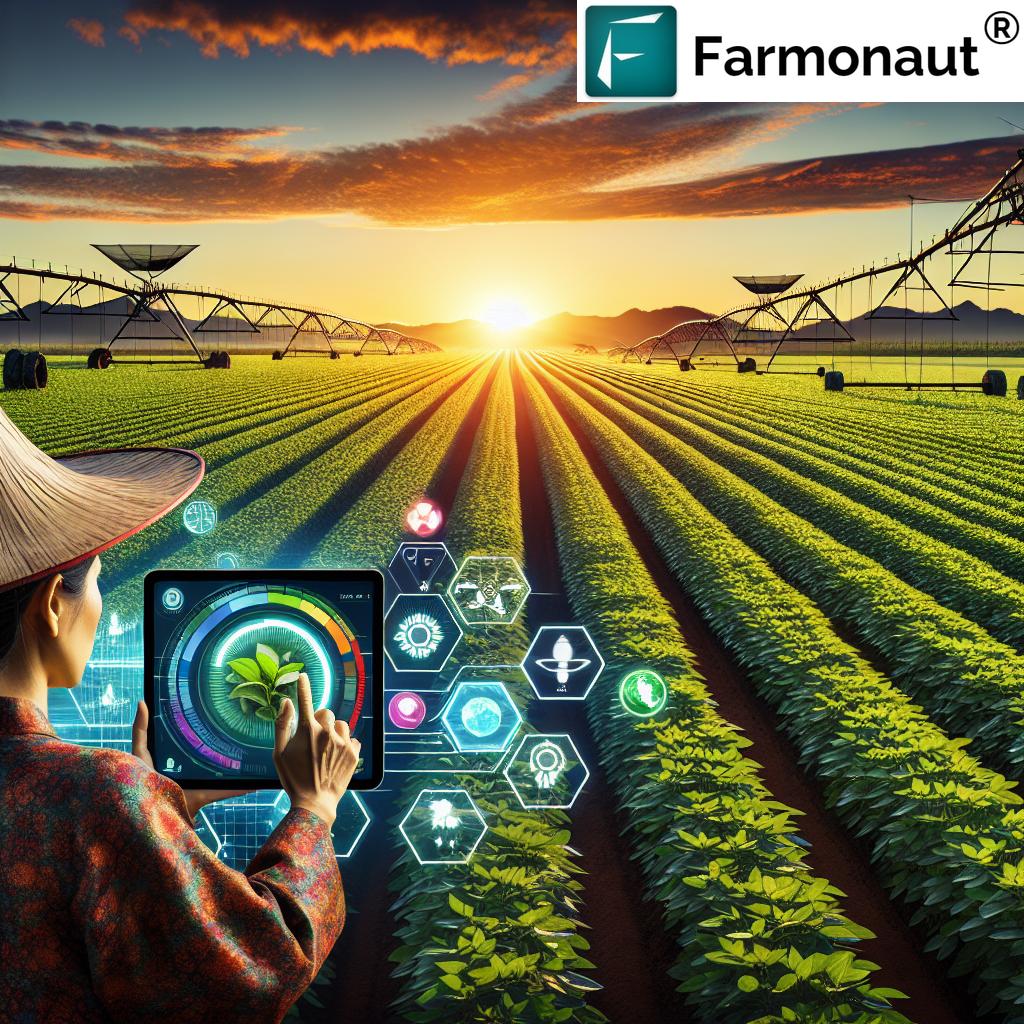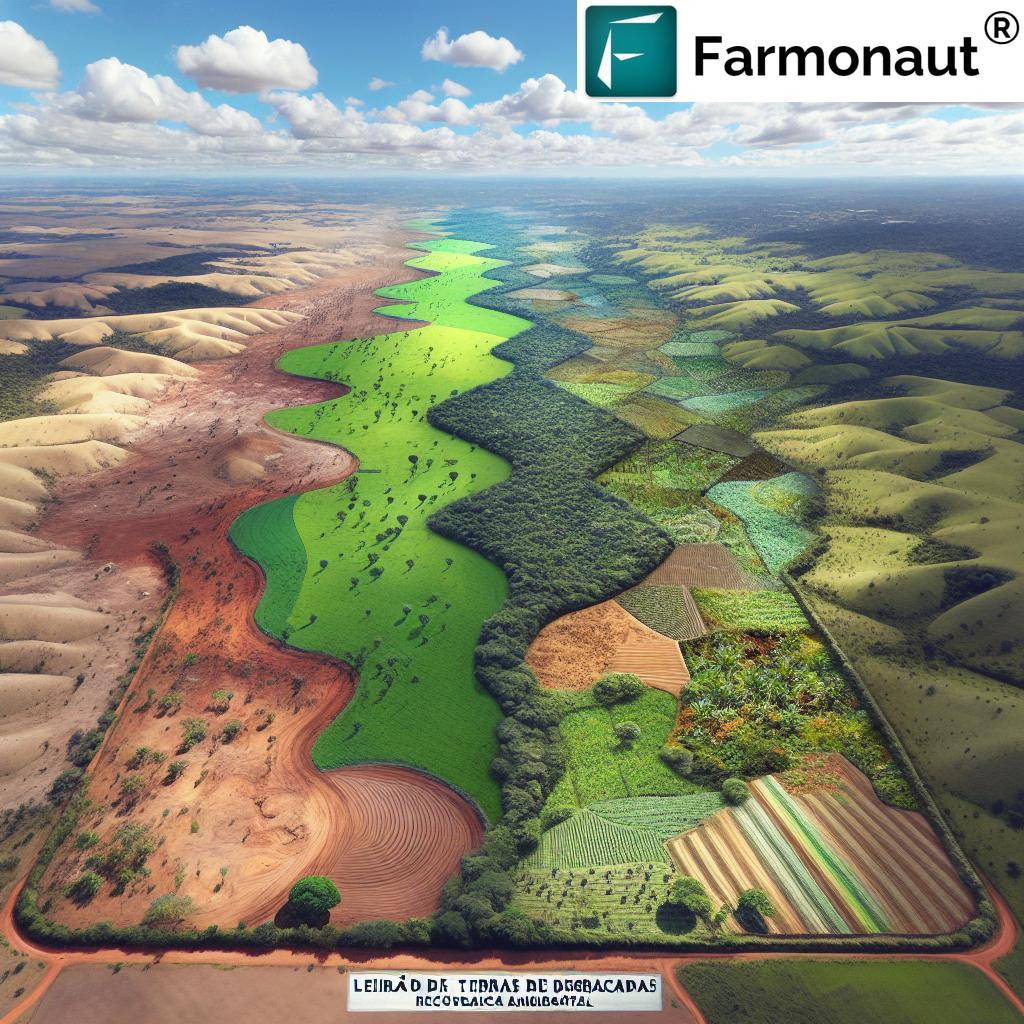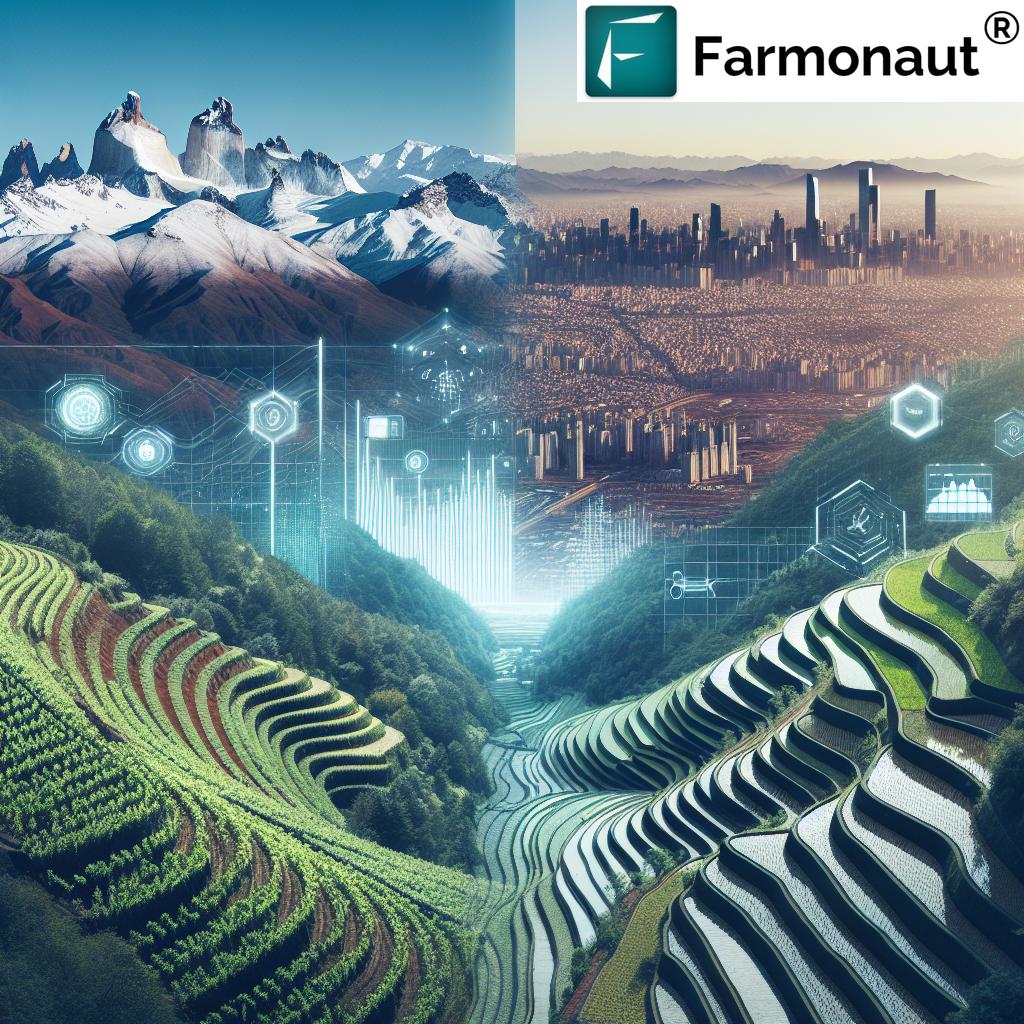Coffee Supply Chain Innovation: 7 Tech Breakthroughs in Brazil
Introduction
The coffee supply chain in Brazil stands as a multifaceted network, connecting farmers, agribusinesses, cooperatives, export networks, and global consumers. With Brazil being the world’s leading coffee producer, advancements here set the benchmark for sustainable agriculture and supply chain efficiency worldwide. From traditional soil cultivation all the way to smart, digital farms, coffee production in Brazil is undergoing a transformation—thanks to modern innovations that target quality, sustainability, and resilience at every turn.
In this comprehensive guide, we examine seven groundbreaking technological breakthroughs revolutionizing the Brazilian coffee industry, empowering farmers, enhancing traceability, boosting yields, and supporting environmental conservation. We also spotlight Farmonaut’s role in enabling precision agriculture and introducing blockchain-based transparency.
1. Precision Agriculture & Digital Technologies in Coffee Supply Chain
At the heart of coffee farming transformation in Brazil lies precision agriculture in coffee production. Precision agriculture refers to the use of digital technologies and data-driven approaches to monitor and optimize various farming processes. The use of tools like satellite imagery, drones, sensor networks, and AI-driven advisory systems empowers farmers by giving real-time insights into crop and soil health, moisture levels, and other environmental factors. Let’s break down these advancements:
How Precision Agriculture is Transforming Coffee Farming
- Satellite Imagery: Platforms like Farmonaut deliver satellite-based crop health monitoring. Using multispectral imagery, farmers can visualize vegetation vigor (NDVI), spot moisture deficiencies, and detect pest/disease outbreaks before they escalate, thus making targeted interventions.
- Soil Moisture Sensors & Smart Irrigation Systems: Replacement of traditional irrigation with smart, data-driven controllers helps optimize water use. These systems use sensor data and weather predictions to deliver the right amount of water, greatly reducing resource waste—a critical factor in drought-prone regions of Brazil.
- Drones: Drones efficiently collect aerial imagery and data, verify plant health, assess field variability, guide fertilization, and even support pest control—all while reducing labor and material costs.
- AI-Based Advisory Systems: Tools like Farmonaut’s Jeevn AI provide customized tips for disease/pest management and optimize input application timing (fertilizers, pesticides) for the highest yield with minimal waste.
By integrating digital technologies in agriculture, Brazilian coffee farmers are achieving greater environmental sustainability, reducing input costs, and maximizing coffee supply chain quality. This evolution also aligns with global consumer demands for traceable, sustainable coffee farming.
Fun Fact: Farmonaut’s blockchain-based product traceability platform empowers coffee companies to securely record the journey of their product from farm to cup. Discover how this secures supply chain transparency and boosts consumer trust.
Benefits Across the Chain
- Increased Yields: Precision monitoring enables timely action, thus higher per-hectare output.
- Resource Efficiency: Optimizes use of water, fertilizers, and energy, lowering costs and environmental footprint.
- Risk Management: Real-time alerts help address crop stress or disease promptly, reducing losses.
You can also leverage these features via Farmonaut’s API and explore technical integration in your supply chain operations, with detailed guides available in the API Developer Docs.
2. Agroforestry in Coffee Farming & Sustainable Practices
Sustainable agroforestry in coffee farming integrates trees, shrubs, or other plants with classic coffee cultivation. This practice brings a multitude of benefits:
- Biodiversity and Soil Health: Trees provide shade, shelter, and microclimates, diversifying flora and fauna while protecting the coffee plants. Their deep roots reach water unavailable to shallow-root coffee, improving soil structure and moisture retention.
- Additional Income Streams: Farmers harvest fruit, nuts, or timber alongside coffee—spreading risk and supporting local economies.
- Regenerative Agriculture: Many Brazilian farmers are adopting regenerative agriculture practices: no-till, cover cropping, organic fertilizers, and reduced pesticide and chemical fertilizer use. This improves resilience to climate change and avoids soil degradation.
- Environmental Conservation: Agroforestry preserves native trees (e.g., for the Atlantic Rainforest), maintains habitats, and supports reforestation—crucial in meeting regulatory demands like the EU’s deforestation rules.
A focus on sustainable coffee farming not only stabilizes production and income for Brazilian farmers but also enhances long-term resilience to climatic and economic shocks.
For more advanced advisory on crop management, pest prediction, and microclimate adaptation, check out large scale farm management solutions designed for plantations and commercial growers.
Agroforestry’s Added Value
- Enhances ecosystem services—pollination, pest control, and water regulation.
- Mitigates soil erosion and nutrient runoff.
- Supports higher quality and typically more complex cup profiles in specialty coffee.
3. Blockchain Coffee Traceability
With growing consumer demand for ethical, authentic, and sustainable coffee, blockchain coffee traceability is taking center stage. This technology securely records each transaction and movement in the coffee supply chain—from farm to processor, exporter, and roaster.
- Transparency & Trust: Blockchain’s immutable ledger allows consumers and importers to verify the exact origin, farming practices, and sustainability credentials of every bag of coffee.
- Reducing Fraud: Secure digital records decrease fraud, errors, or tampering, especially critical for specialty and organic certifications.
- Efficiency: Instant data sharing improves logistics and reduces paperwork; quality assurance is streamlined, and premium payments can directly reach farmers.
In Brazil, blockchain-enabled networks are tracking millions of bags of coffee annually. Tools like Farmonaut’s product traceability module offer seamless, cost-effective blockchain integration for producers, processors, and brands.
Blockchain Use Case: A coffee buyer in Europe scans a code and instantly sees farm GPS, harvest date, processing method, and sustainable farming records—all verified by blockchain.
If you wish to implement this transparent system, explore Farmonaut’s product traceability platform—a plug-and-play blockchain solution for agriculture supply chain networks.
4. Vertical Integration Across the Coffee Supply Chain
Vertical integration involves companies directly owning or managing multiple stages of the coffee supply chain, from farming to roasting to retail. In Brazil, and globally, large coffee brands are increasingly investing in their own farms or working closely with established grower networks to:
- Ensure Consistent Quality: Direct control over cultivation, processing, and logistics offers superior quality assurance to meet premium market standards.
- Facilitate Sustainable Practices: Companies experiment with agroecological approaches, native tree replanting, and water-saving systems at their own farms before sharing successful models with smallholders and suppliers.
- Increase Resilience: By shortening the chain, brands are less exposed to supply disruptions and market volatility.
While resource-intensive, vertical integration allows for innovation pilot programs in biofertilizers, digital monitoring, and renewable energy, fostering faster adoption across Brazil’s wider coffee network.
5. Breeding Climate-Resilient Coffee Varieties
As climate change alters rainfall patterns and average temperatures in Brazil, developing climate-resilient coffee varieties is crucial for securing the supply chain’s future. Research centers and agronomists are focusing on:
- Drought Tolerance: New arabica and robusta hybrids withstand longer dry periods and water scarcity without sacrificing bean quality.
- Heat Tolerance: Genetic breeding programs aim to push the upper limits of heat stress, keeping fragile arabicas viable at lower altitudes as global warming advances.
- Pest & Disease Resistance: Strengthening resistance to leaf rust, nematodes, and other increasing threats.
Distributing these improved coffee varieties to farmers—often alongside digital training and precision soil health management tips—enables the entire chain to adapt in a changing climate.
6. Automated Coffee Harvesting Technologies
One of the most labor-intensive stages in the coffee supply chain is harvesting. Brazil, with its large and mostly flat coffee farms, is well positioned to adopt automated coffee harvesting systems. These include:
- AI-Guided Robotic Harvesters: Machines identify, select, and pick only the ripest cherries, improving cup quality and minimizing waste, while reducing the risk of labor shortages during peak harvest.
- Automated Sorting & Processing Equipment: Use of machine vision to separate defective beans and streamline post-harvest handling.
Though initial investment is significant, the long-term efficiency gains, labor cost savings, and consistency are immense, especially as rural workforces age or migrate to urban centers.
Pairing these harvesting robots with digital field management tools and satellite-based field maps further increases operational precision. Learn how Farmonaut’s fleet management module helps large plantations optimize the deployment of their harvesting fleets for peak efficiency.
Advantages of Automated Coffee Harvesting:
- Reduces crop loss from over/under-ripening or missed harvest windows.
- Minimizes dependency on variable labor markets.
- Enables precise data collection for yield and quality analytics.
7. Renewable Energy Coffee Farms
As the push for decarbonization accelerates, renewable energy adoption in coffee farms is vital for reducing carbon footprint and promoting environmental conservation. Common clean energy solutions in Brazilian coffee production now include:
- Solar Panels: Powering everything from irrigation pumps to coffee processing mills, solar systems slash greenhouse gas emissions and cut electricity costs, especially off-grid.
- Wind Turbines: In wind-rich regions of Brazil, turbines supply sustainable power for 24/7 processing operations and reduce reliance on fossil fuels.
- Energy Storage & Microgrids: Modern batteries and smart microgrids stabilize farm operations, even during regional power disruptions.
By transitioning to renewables, coffee farms meet new international sustainability standards and appeal to the eco-conscious global market. For a complete guide on monitoring and tracking your farm’s carbon footprint, see Farmonaut’s Carbon Footprinting Platform.
Key Impacts:
- Significantly reduces total CO2 emissions per bag of coffee.
- Stabilizes production costs amidst rising energy prices.
- Supports regulatory compliance (such as EUDR and global GHG targets).
Additional Innovations Enhancing the Coffee Supply Chain
Regenerative Agriculture Practices
Beyond just minimizing harm, regenerative agriculture practices actively restore soil health, biodiversity, and carbon stocks. In Brazil, techniques include:
- Cover cropping and reduced tillage to prevent soil erosion.
- Use of compost/organic fertilizers to boost organic matter and water retention.
- Multispecies intercrops to build resilience and reduce pest pressure.
Adopting these practices has resulted in more robust and climate-resilient production systems, ensuring the long-term viability of coffee agriculture.
Digital Farmer Profiling & Support
Digital farmer profiling refers to the collection and utilization of data about each producer to deliver personalized support. Mobile apps and digital tools:
- Enable targeted training and technical assistance based on each farmer’s land, crops, and local challenges.
- Streamline procurement, financing, and the introduction of sustainable farming techniques.
- Help companies meet sustainable sourcing certification rules.
On an industry scale, this data-driven network strengthens the connection between all coffee supply chain participants and enhances product quality.
Cooperatives, Unions, and Fair Trade
- Cooperatives consolidate smallholders’ output, negotiate better prices, and invest in local infrastructure, schools, and clinics—thus supporting vibrant rural economies.
- Unions like those in Ethiopia serve as global models, but Brazilian cooperatives are increasingly vital to maintain bargaining power as supply consolidates and export markets evolve.
Compliance with Sustainability Regulations
The EU’s Deforestation Regulation (EUDR) now requires proof that coffee and other commodities are deforestation-free to enter European markets. This raises the bar for documentation, transparency, and sustainable land use—especially for smallholder farmers who rely on traceability technology and coordinated support systems.
Key Tech Breakthroughs in Brazil’s Coffee Supply Chain
| Breakthrough Name | Short Description | Estimated Implementation Rate in Brazil (%) | Impact on Sustainability | Estimated Cost Savings (%) | Coffee Quality Improvement |
|---|---|---|---|---|---|
| Precision Agriculture & Digital Technologies | Use of satellite imagery, sensors, drones, and AI for real-time crop management | 70 | High | 20-30 | Yes |
| Agroforestry & Sustainable Coffee Farming | Integrating trees to promote biodiversity and resilience | 55 | High | 15-20 | Yes |
| Blockchain Traceability | Securing and documenting each stage of supply chain with blockchain | 40 | Medium | 10-15 | Yes |
| Vertical Integration | Direct company ownership from farm to cup | 25 | Medium | 10-12 | Yes |
| Climate-Resilient Coffee Varieties | New arabica/robusta breeds adaptive to heat, drought, disease | 30 | High | 8-15 | Yes |
| Automated Coffee Harvesting | AI-powered robotic pickers reduce labor dependency | 20 | Medium | 20-25 | Yes |
| Renewable Energy Adoption | Use of solar & wind to power field and processing equipment | 35 | High | 15-23 | Yes |
FAQs: Coffee Supply Chain Innovation in Brazil
1. Why is precision agriculture important in coffee production?
Precision agriculture maximizes yield and quality, reduces input costs (fertilizer, water, pesticides), and improves environmental sustainability by enabling targeted interventions based on real-time data.
2. How does blockchain enhance coffee supply chain traceability?
Blockchain creates a secure, tamper-proof digital record of each coffee bag’s journey from farm to consumer, ensuring transparency, reducing fraud, and enabling verification of sustainability claims.
3. What are the benefits of agroforestry in coffee farming?
Agroforestry boosts biodiversity, improves soil health, reduces erosion, stabilizes microclimates for coffee, provides additional farmer income, and enhances resilience to climate change.
4. Can smallholder coffee farmers in Brazil afford these innovations?
Companies like Farmonaut offer scalable, affordable, and accessible digital tools (app, API, advisory), making precision agriculture viable for farms of all sizes.
5. How does renewable energy adoption help coffee farms?
Solar and wind power reduce energy costs, cut emissions, increase resilience against grid failures, and help farmers meet stricter export regulations and consumer demands for sustainability.
6. How do digital tools support compliance with new regulations like EUDR?
Digital traceability platforms and georeferenced databases allow farms to easily generate deforestation-free documentation, supporting exports to high-value European markets.
Conclusion: Building a Resilient, Sustainable Coffee Supply Chain in Brazil
The landscape of coffee production in Brazil is being revolutionized by innovation. As we’ve explored, precision agriculture in coffee production, sustainable agroforestry in coffee farming, blockchain coffee traceability, vertical integration, automated harvesting, renewable energy, and climate-resilient coffee varieties are rapidly changing the face of this iconic industry.
These advancements ensure that coffee supply chain participants can maintain high quality, efficiency, and transparency from cultivation to consumption. Most importantly, they enable farmers and agribusinesses to meet rising export standards, climate challenges, and global demands for sustainability—all while strengthening Brazil’s position as a global coffee leader.
We encourage you—whether a farmer, trader, or coffee enthusiast—to stay informed and leverage these digital and technological tools. If you’re ready to empower your farm with real-time monitoring, supply chain transparency, and advanced support, explore Farmonaut’s innovative solutions and robust subscription plans below for accessible, affordable, and scalable technology adoption:
Ready to try?
Download the Farmonaut App or launch directly on web, Android, or iOS using the links above and take the next step in digital agriculture.
For developers and agribusinesses looking to integrate satellite and weather data into their coffee supply chain or traceability systems, check out our Farmonaut API and technical documentation.

